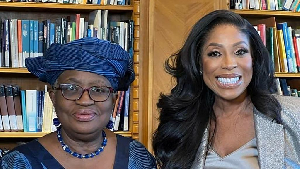Some respected women within Ghana’s maritime industry have encouraged the younger generation of women to take advantage of the opportunities in the port and maritime industry, especially in this era where automation has made activities in the industry more attractive and less physically demanding.
“It had been challenging but there has been improvement. We are encouraging women, because now the technology has changed,” Felicity Ankoma-Sey, a Dean of the Faculty of Maritime Studies at the Regional Maritime University stated.
The International Maritime Organization has dedicated the 2019 World Maritime Week to empower women in the maritime industry. In this light, the three women who have accomplished quite significantly in their various fields of areas in the maritime space namely, Sylvia Asana Dauda Owu, the Deputy Chief Executive of the Ghana Shippers’ Authority, Esther Gyebi Donkor, General Manager, Marketing and Corporate Affairs, Ghana Ports and Harbors Authority, and Felicity Ankoma-Sey, Dean of the Faculty of Maritime Studies at the Regional Maritime University, took advantage of the International Maritime Organization’s 2019 theme of women empowerment to champion the cause of women and encourage the younger generation through Eye on Port’s live interactive program.
Sylvia Asana Owu revealed that evolving technology for shipping and logistics equipment, requires intellect more than physical energy, so women can take up courses which would equip them with the requisite skills to work around the port industry.
“They are even trying to come up with vessels that will be automated that would not even need a captain on the vessel for it to move. This is how far the industry has evolved so if you are a female and you are a captain, going forward you may not even need to be on the vessel,” she expressed.
Sylvia Asana Owu, whose career in the sector has span about 26 years, said women should be able to go out of their comfort zones to explore other areas of work, just as she did and discovered tremendous growth in her career.
Felicity Ankoma-Sey, a Dean of the Faculty of Maritime Studies at the Regional Maritime University, the institution designated to cater for training of port, shipping and maritime professionals, said the University has a vast array of essential courses for prospective professionals of the maritime industry.
She urged people looking to pursue the industry to take advantage of the institution, especially women, since over the years, it has been mostly dominated by men.
On the concern for general unemployment in the country and particularly, for graduates of the Maritime University, she revealed that her outfit has engaged some Maritime and Shipping companies, in an MoU to employ majority of their staff from the university.
However, she admitted there is room for improvement and opined that the proposed legislation that backs local participation in port and shipping, would mitigate the national unemployment crisis, particularly in the maritime sector.
“One thing I believe will open a lot of opportunities for people in the industry is if the cabotage law is passed. This is a law that encourages local participation in shipping,” she disclosed.
Esther Gyebi Donkor, General Manager, Marketing and Corporate Affairs, Ghana Ports and Harbors Authority, who praised the Ghana Maritime Authority for encouraging women participation in its decision making, also encouraged robust legislation that would create avenues for women in Ghana’s port and maritime industry.
“I am aware that there is a transport policy that is being drafted and probably this is the time that we should take a look at putting certain things in there to cover the women,” she said.
Recounting her challenges during her tenure as operations manager at the Port of Tema, she called for transformation in the organizational culture in Ghana’s port, shipping and maritime institutions, in order to fully harness the potential of women in that sector.
“Some form transformation of our organizational culture is also needed so that everybody will appreciate that all these submissions that women are making about equality is not that we want things on a silver platter but then for equal opportunities,” she asserted.
She requested for increased on-job training for women, to be able to improve women’s practical skills for the technical tasks that the port and maritime industry poses.
The General Manager of Marketing and Corporate Affairs, GPHA, however, entreated women to strive to attain a balance between their domestic, social roles and professional lives in order to effectively exhibit the level of productivity they have continually touted for themselves.
“We still have this dual role of women that we need to manage very well. Our male colleagues are very warming; they are ready to work with us. I believe that it is us the women that should take up the challenge and be very responsible and make sure that when we are placed, we are able to deliver,” she said.
Business News of Thursday, 26 September 2019
Source: Eye On Port













